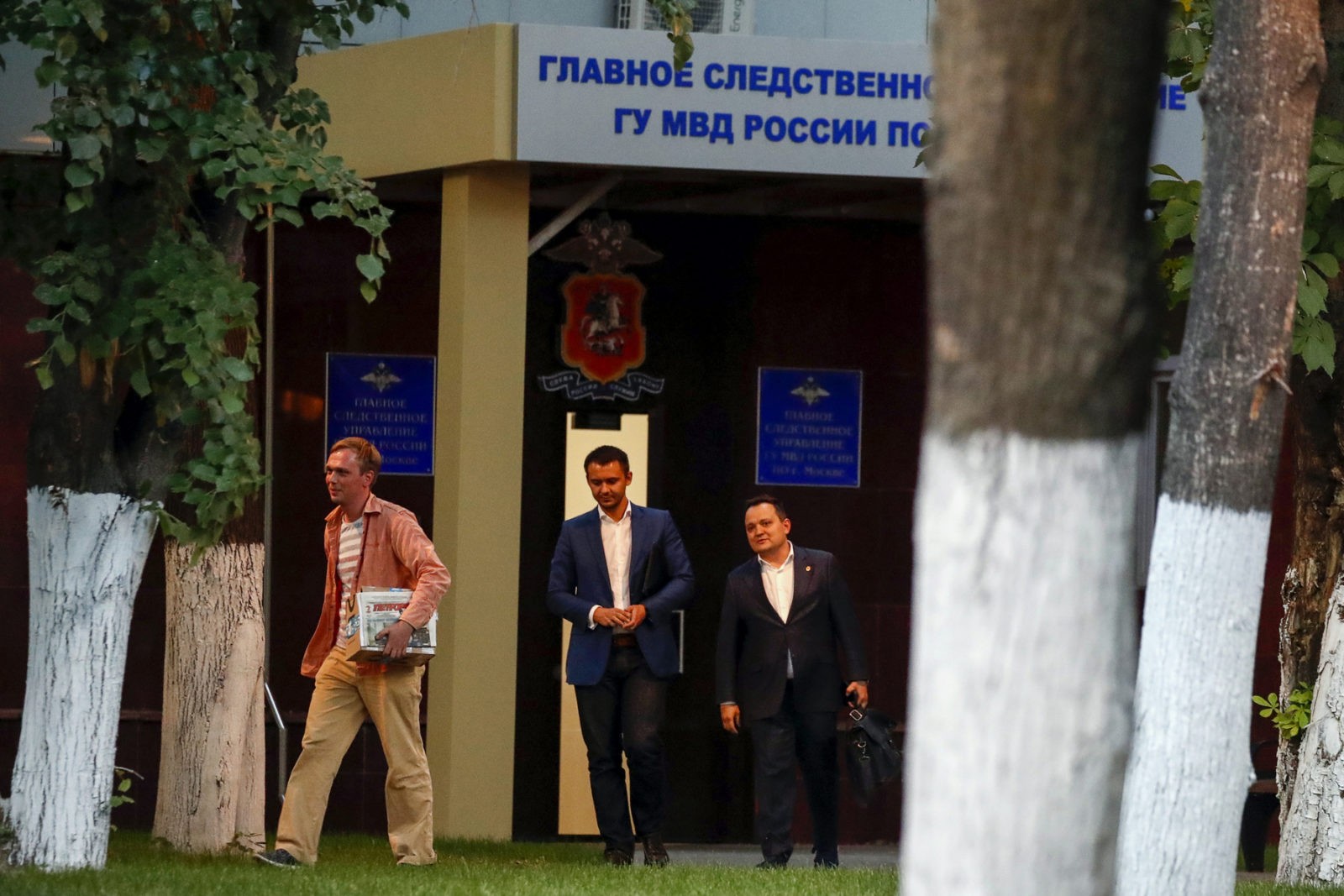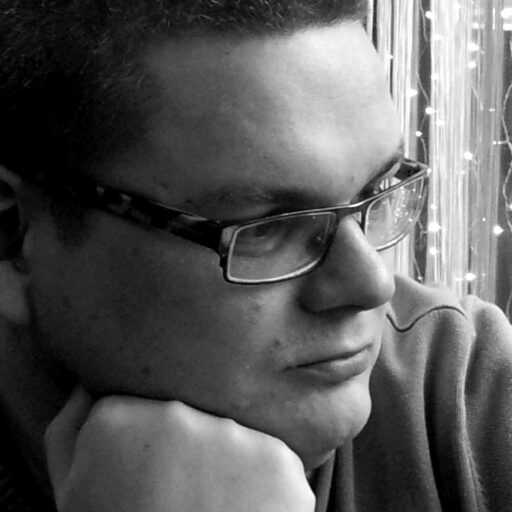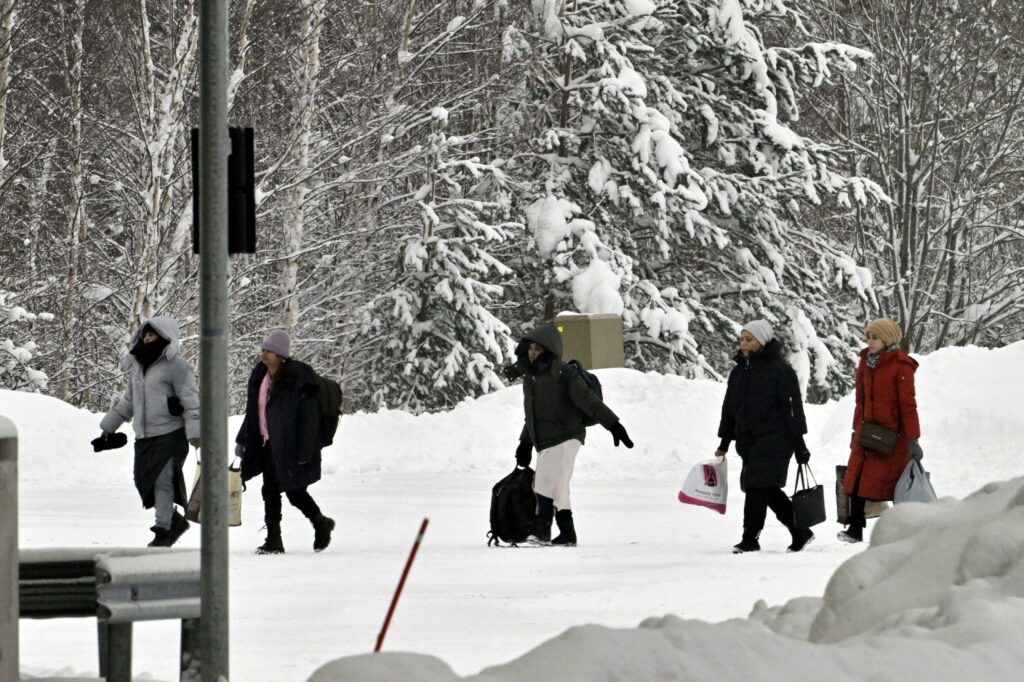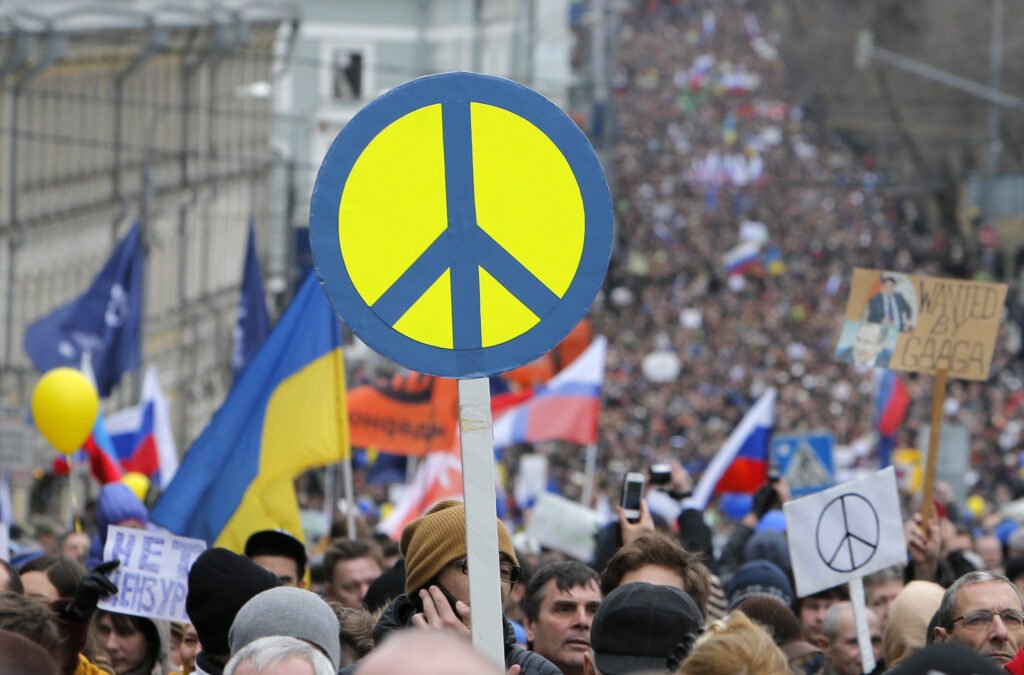The investigative journalist Ivan Golunov has walked free. It is hard to remember another recent case where events developed as quickly, and political life has been so highly charged, as with the campaign for his release. Golunov, a reporter for Meduza, was detained on Thursday 6 June, a fact which only became known the following day. Narcotics were planted on Golunov, who was beaten, subjected to sleep deprivation, and refused contact with his lawyer. In an instant, a powerful civic campaign in solidarity with the journalist began.
It was all too clear that the police had been telling flat-out lies. On Friday, Presidential Press Secretary Dmitry Peskov was forced to answer a question about Golunov’s arrest while attending the St Petersburg Economic Forum. In response, Peskov remarked on photos ostensibly taken during a search Golunov’s home and later published by the police. As these photographs showed an entire narcotics laboratory, what doubt could there be that the police had responded appropriately? In fact, quite a lot; after several hours, it turned out that eight of the nine published photographs were fakes. The sole genuine photograph showed the detained man’s passport and a few flash drives. Meanwhile, outside the central offices of the Ministry of Internal Affairs at 38 Petrovka Street, protesters had started holding solo demonstrations. The first protesters were detained by police (although Russian law does not demand any prior permission from the authorities to hold solo demonstrations, unlike mass protests.) All those detained were soon released. Rumours surfaced that “somebody from above” had commanded police to respect the law. It was an important moment, and one to which will will return later.
Protests spread throughout St Petersburg and other cities. Golunov’s investigations into corruption were shared widely on social media and republished by several independent media outlets. Even some employees at state propaganda outlets started to speak out in defence of the journalist. There was no coordinated media campaign against Golunov; while television channels tried to defend the actions of the police, the pages and social media accounts of pro-government bloggers were in complete disarray.
On Saturday evening the court sentenced Golunov to house arrest, rather than prison. The ruling was welcomed by protesters as a sign that they had triumphed, if not as an utter miracle. Yet the demonstrations in support of Golunov continued through to Monday. The protesters still stood on Petrovka Street. The country’s three leading business newspapers, Vedomosti, Kommersant, and RBK, ran the same front cover bearing the words “I/We are Ivan Golunov,” demanding an honest investigation. That demand was also echoed by employees of state television channels, even before biased news reports about the case went on air. It had now become obvious that society had a clear chance of victory.
On Tuesday it became known that a group of independent journalists who planned to hold a march in central Moscow on 12 June (Russia Day) in support of Golunov had done so without prior agreement with the mayor’s office and refused to participate in closed-door negotiations as proposed by Deputy Mayor Alexander Gorbenko. It was the last straw. Chairwoman of the Federation Council Valentina Matviyenko called Golunov’s arrest an “act of huge incompetence or a provocation.” A few hours later, Minister of Internal Affairs Vladimir Kolokoltsev announced that the case against Golunov was closed, that the operatives who had detained the journalist were being suspended from their duties pending the completion of an internal investigation, and that he would petition the president to fire Yuri Devyatkin (head of the Department for Drugs Control of the Ministry of Internal Affairs’ directorate for the Moscow region) and Andrey Puchkov, head of the Ministry of Internal Affairs’ directorate for Moscow’s Western Administrative Region (as both positions are appointed by presidential decree, any decisions regarding their occupants can only be taken by the president). Vladimir Putin took Kolokoltsev’s recommendation on board and fired the two generals.
Golunov was released. Meduza’s chief editors Ivan Kolpakov and Galina Timchenko called on protesters not to attend the planned march on 12 June, but instead to await permission for a sanctioned demonstration. Their call divided protesters. Some of the march’s organisers resigned their positions. Others attempted to reach an agreement with the mayoralty but failed to do so. According to police data, 1,200 people attended the march (I estimate significantly more: around 3,500). The police made various attempts to obstruct the peaceful march, but eventually resorted to stricter and even brutal measures. Over 400 people were detained.
That was a brief recap of recent events. My conclusions are as follows:
Firstly, Ivan Golunov was fortunate in some ways. Those who ordered his arrest and those who carried it out were simply unable to find a political agenda to shield themselves from the consequences of their own actions. Putin may have said some important thinks at the St Petersburg Economic Forum, but in the eyes of Russia’s independent journalists and, crucially, international media, the event was simply drowned out. The number one event on the news agenda was the detention of Golunov and the subsequent protests in Moscow. The story was a simple one: in defending their petty corruption, police officers were willing, as a matter of routine, to destroy the life of an ordinary citizen. But in the process they ruined all their boss’s plans. They probably never expected that Golunov’s arrest would provoke such a reaction, which explains why they prepared such a sub-standard “special operation” and falsified evidence of no better quality.
Secondly, Russia’s independent and even conditionally independent media were able to demonstrate that, despite the many difficulties that the authorities present for the press, the media community still has certain levers of influence at its disposal. Journalists are able to mobilise themselves and mobilise others, organising political protests and going on the offensive by concentrating public attention on the cause at hand. But this was about more than professional solidarity. The strength of those journalists who defended Golunov lay in the fact that they were able to win over those who are critical of the regime but far removed from political activism; here, in plain sight, was an obvious outrage committed by law enforcement officers. These events did not just offend media professionals, and not just media professionals came out onto the streets to demonstrate or onto social networks to raise awareness of Golunov’s investigations.
Thirdly, the idea to hold an unsanctioned protest march and reject closed-door negotiations with the mayor’s office represented a decisive blow to the authorities. With these steps, the authorities were forced into Zugzwang; any move they took would only worsen the situation. Breaking up a peaceful demonstration would have only confirmed that the case against Golunov was fabricated, and that the authorities had no arguments in its defence besides truncheons. On the other hand, such a demonstration would have been impossible to ignore; attempting to ignore it would have proven the protesters right. In the end, the authorities had to release a journalist and sacrifice not just pawns, but pawns in generals’ uniforms. But there was no other way out.
“Victory has many fathers,” as the saying goes. Even before Golunov’s release, “anonymous sources” reported that the decision to sentence the journalist to house arrest was agreed by Anton Vaino (head of the presidential administration), and that his deputy Alexey Gromov gave state media channels the green light to support Golunov. Dmitry Muratov, chairman of the board of Novaya Gazeta, has said that he, along with head of Ekho Moskvy Alexey Venediktov, met with two deputy mayors before the trial: Gorbenko and Natalya Sergunina. The meeting was attended by Oleg Baranov, head of the Ministry of Internal Affairs’ Moscow directorate. Thus some high profile opposition journalists were able to explain to government officials that the investigation was flimsy and its arguments weak. Later, another meeting took place after which the presidential ombudsperson for human rights Tatyana Moskalkova reported her findings on the case to Putin. Further investigations were carried out, and our “most just” president, now convinced of Golunov’s innocence, made the necessary calls.
At this point, the authorities launched a counterattack to salvage their image. An army of paid bloggers and a number of anonymous Telegram channels, working on the orders of the presidential administration, rushed to suggest that the release of Golunov was thanks to good and honest officials, as well as the president’s personal intercession. They tried to present the case as a regrettable but unusual case, decoupled from any wider contexts or trends. In this retelling, unscrupulous police officers attacked an honest journalist, but the government immediately understood what was happening and took action to save him. After Golunov’s release, Pervy Kanal presented a surprisingly cynical view of recent events which had, said the channel, been resolved “due to the balanced position of the investigation.” Here we must remember that the bedrock of this investigation was drugs planted on the journalist; in such circumstances, the only “balance” worth discussing concerns the scales used to weigh the drugs. Indeed, the narcotics were very carefully measured, in order to calculate exactly what amount was required in order to frame the victim with a “large-scale sale operation” of prohibited narcotics.
Amid all this, the political opposition, concerned journalists, and all those who simply sympathised with the protests had plenty of opportunities to argue until they were hoarse about whether or not to attend the march on 12 June. To give credit where credit is due, the authorities here succeeded in splitting the protest movement, tempering the wave of anger, and regaining the initiative. An important lesson from these events is that the party system in Russia remains a pure fiction: independent media can step into the role of a proto-party, but it is a role which media fears, and recoils from overtly political activism in deference to political impartiality (a fear demonstrated by Meduza’s leadership). In cases such as these, a protest has no further prospect of gaining momentum; once the local goal is achieved, it simply dies out.
My sixth point is the most important. Golunov is free. He was pulled out from the jaws of the system before it had a chance to chew him up. In Russia, this is a rare achievement. Had there been no protests, no response, and no noise, then nothing of the sort would have happened. Neither Vaino, Gromov, Moskalov, nor Putin suddenly developed a newfound love for freedom and justice. They reacted to an unpleasant shock. Neither closed-door negotiations nor the St Petersburg Economic Forum could have saved Ivan without mass protests. This is a victory for civil society, which showed its ability to spontaneously spring into action when needed.
But there is one further important victory here. Each episode such as this broadens and deepens the public perception of the state. This includes a darker, understated knowledge in the evils of the state, which are usually tolerated with the words “everybody knows and everybody suffers.” When the next common misfortune can be dragged out of the shadows into the light, it not only helps the system’s individual victims. Such revelations change social attitudes towards problematic sides of the state, giving a small chance for positive changes in future. For example, everybody knows that prison in Russia is a living hell, but this instinctive knowledge acquired a qualitatively different status after a widespread media campaign against torture. Everybody knows that drugs are often planted on innocent people by order of the authorities, and that this is an easy way to deal with a business rival if one has connections to the police or security services. The Golunov case will not change this situation overnight, but little by little it will begin to change it.
Of course, even in defending itself, and even by trying to appropriate the talking points of the poorly organised critics of the regime, the state nonetheless exposes itself. The story of Golunov’s arrest is the story of the collapse of key government institutions; after all, the state has admitted as much in its explanations to its citizens. The police were immediately taken out of the equation: even closed-door negotiations were conducted with Moscow’s deputy mayors instead. As Russia Today’s editor-in-chief Margarita Simonyan wrote in one Tweet: “Does anybody really doubt that the Ministry of Internal Affairs could have easily drawn on any expertise they needed and convinced anybody in the neighbouring towers? It seems not.” Similarly, Simonyan did not understand that her words were a damning verdict on that ministry’s competence, especially coming from her lips.
Vaino is now credited with “reaching an agreement with the court,” while this praise is also a frank confession that there is no judicial independence in Russia. Gromov’s ability to give permission to state-owned media to support Golunov is also a perfect example for those who claim that state-owned media outlets are not media in any real sense of the word, but cogs in a propaganda machine. Police were given the command from on high to “abide by the law,” as though without such a command even the police are not obliged to comply with it.
I could go on. There are plenty more examples, but the most important element to them is the source; to be able to confirming one’s darkest suspicions about the state with statements from top state officials is no small achievement.
Ivan Golunov is free, but other political prisoners still languish behind bars. Hundreds of people have been detained at a peaceful protest march in Moscow. The government does not like to retreat, and will certainly try to get even. Nevertheless, we have managed to save one person, and in that process we have learned a lot about our rulers and ourselves. It is not insignificant that Kolpakov and Timchenko were also on that march.
On 16 June, another event is planned in Moscow in support of Ivan Golunov. It will be sanctioned by the authorities; among those who have applied for permission to hold the event are Russia Today journalist Ekaterina Vinokurova, owner of Moskovsky Komsomolets Pavel Gusev, and the head of the government-controlled Russian Union of Journalists, Vladimir Soloviev (the namesake of the television presenter). In all likelihood, they will thank freethinking government officials for their munificence, taking great pains to demonstrate that those marching in the capital are not unprincipled rabble-rousers who are ready to be outraged about anything, but also respectable citizens who are able to appreciate the heartfelt gestures of the regime’s human face.
In any case, nobody should feel any obligation to attend this march. But it is worth remembering that real change will take place when we learn to see the general behind the particular, and when we see policy behind acts of arbitrary cruelty. Only then will we learn that to confront this policy, our demands must be formulated in the language of politics.










